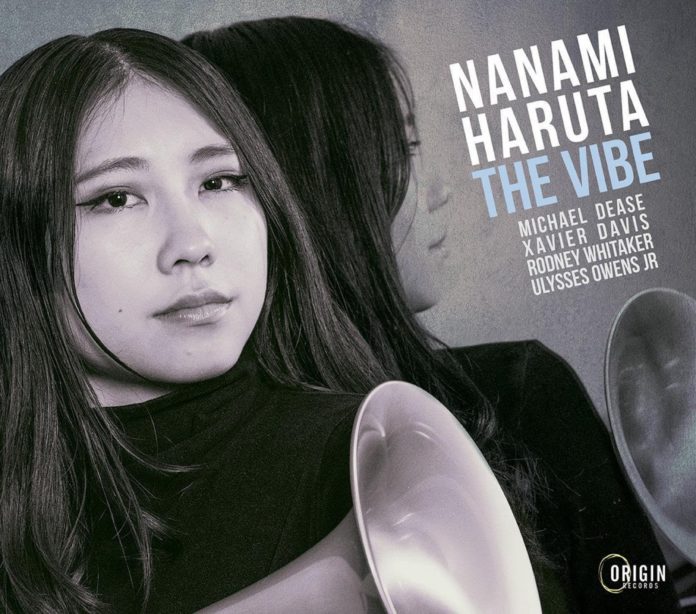Out February 28, 2025 via Origin Records, The Vibe boasts an all-star rhythm section stocked with modern giants of the tradition: pianist Xavier Davis, bassist Rodney Whitaker and drummer Ulysses Owens Jr. Alongside Dease, who switches to baritone sax on two tracks, Haruta feels right at home among these virtuosic veterans, revealing a dexterity and creative imagination far beyond her years.
“Nanami has this ethereal deftness on the trombone that makes you forget how cumbersome and challenging it can be,” Dease says. “Her musical spirit has the fire of Detroit’s Curtis Fuller mingled with the pastoral charm of her native Japan’s Sapporo countryside. I see her potential to become the leading voice on trombone in her generation, and I know Nanami will play a role in the future of jazz music.”
For Dease to draw comparisons to Curtis Fuller is no small compliment – he has long cited the legendary trombonist as one of his primary heroes and the reason that he initially switched from saxophone to the ‘bone. The pair play direct homage to Fuller on The Vibe with his composition “Algonquin,” originally recorded in 1957 for Fuller’s Bone & Bari with baritone saxophonist Tate Houston. Dease, who recently has been enjoying a parallel career on the low horn, steps into Houston’s role as Haruta ably plays the Fuller part. Whitaker’s own deep connection to the tune is threaded throughout, as he and Fuller both lived on Detroit’s Algonquin Street.
Haruta’s own journey to the Motor City environs (Lansing, to be exact) started in Sapporo, the capital of the Hokkaido prefecture, the largest and northernmost of Japan’s islands. She started out playing classical piano but switched to the trombone at the age of eight to play in her elementary school band. She can’t recall what exactly the initial attraction was, other than the fact that, “the name was kind of funny,” but grew to love the instrument for its ability to parallel the sound of the human voice.
Haruta took to the instrument, and to jazz, almost immediately. “Classical piano was boring to me because it meant practicing exactly the same thing over and over again,” she says. “Everything about jazz is so hip. Even if I play the same tunes, even with the same solo order, it sounds completely different every time. With jazz, I always feel like I’m creating the music.”
By 2019 Haruta’s gifts were being recognized both on bandstands in her native Japan and with honors like the Most Outstanding Student Award at that year’s Seiko Summer Jazz Camp in Tokyo. But perhaps the more important takeaway from the camp was her connection with Dease, who encouraged her to relocate to the States and study with him at MSU.
Haruta was set to make the move in 2020 – but like everything in that lockdown year, those plans were interrupted. Instead, she took the opportunity to leave Sapporo for the more thriving jazz scene in Tokyo as pandemic restrictions eased. “Tokyo has a big jazz community and many great musicians,” she says. “I was gigging almost every day, which really changed my playing.”
With that experience under her belt Haruta was even better prepared to embrace the lessons at MSU, where she finally arrived in the summer of 2023. There she’s been mentored not only by Dease but by Whitaker and Davis, both of whom have enlisted her for their own bands. She’s also continued to garner accolades, including the Yamaha Young Performing Artist Award, the Michigan Jazz Festival Award, top spot at the Carl Fontana Jazz Trombone Soloist Competition, and as part of the Dease-led ensemble that won the Kai Winding Jazz Trombone Ensemble Competition.
One listen to The Vibe will convince any listener not swayed by this growing list of laurels. The album’s carefully chosen repertoire reveals Haruta’s ability to navigate a wide variety of settings. In addition to the Fuller classic, the contemporary jazz canon is represented by two choices by modern masters: pianist Renee Rosnes’ spirited “Girlie’s World,” which opens the album, and bassist Christian McBride’s powerful “Sister Rosa.” There are also two compositions from the pen of co-producer Gregg Hill, whose music Dease has featured on two recent recordings.
Dease himself offers the tender ballad “How It Goes,” highlighted by an elegant Whitaker solo, while the bassist contributes “Jamerson’s Lullaby,” a graceful tribute to Whitaker’s son Jamerson.
The album is rounded out by three of Haruta’s own tunes. The dancing, buoyant “Toshi” is an ode to her first mentor, the late pianist Toshiaki Yamada, who, Haruta says, “showed me how to love the music and find meaning in the music. He told me never to play without thought.” The lovely “Heartstrings” is a serenade to Haruta’s romantic partner, while “Woodpecker” is a jaunty bop number whose insistent rhythm echoes the hammering sound of its avian title.
The Vibe closes with a gorgeous rendition of the Alex North classic “Unchained Melody,” inspired by its inclusion in one of Haruta’s favorite films, Ghost. Here the band is pared down to just Haruta, Whitaker, and guitarist Chris Minami, an MSU peer, fully revealing the nimble control and breathtaking expressive beauty of Haruta’s sound.







